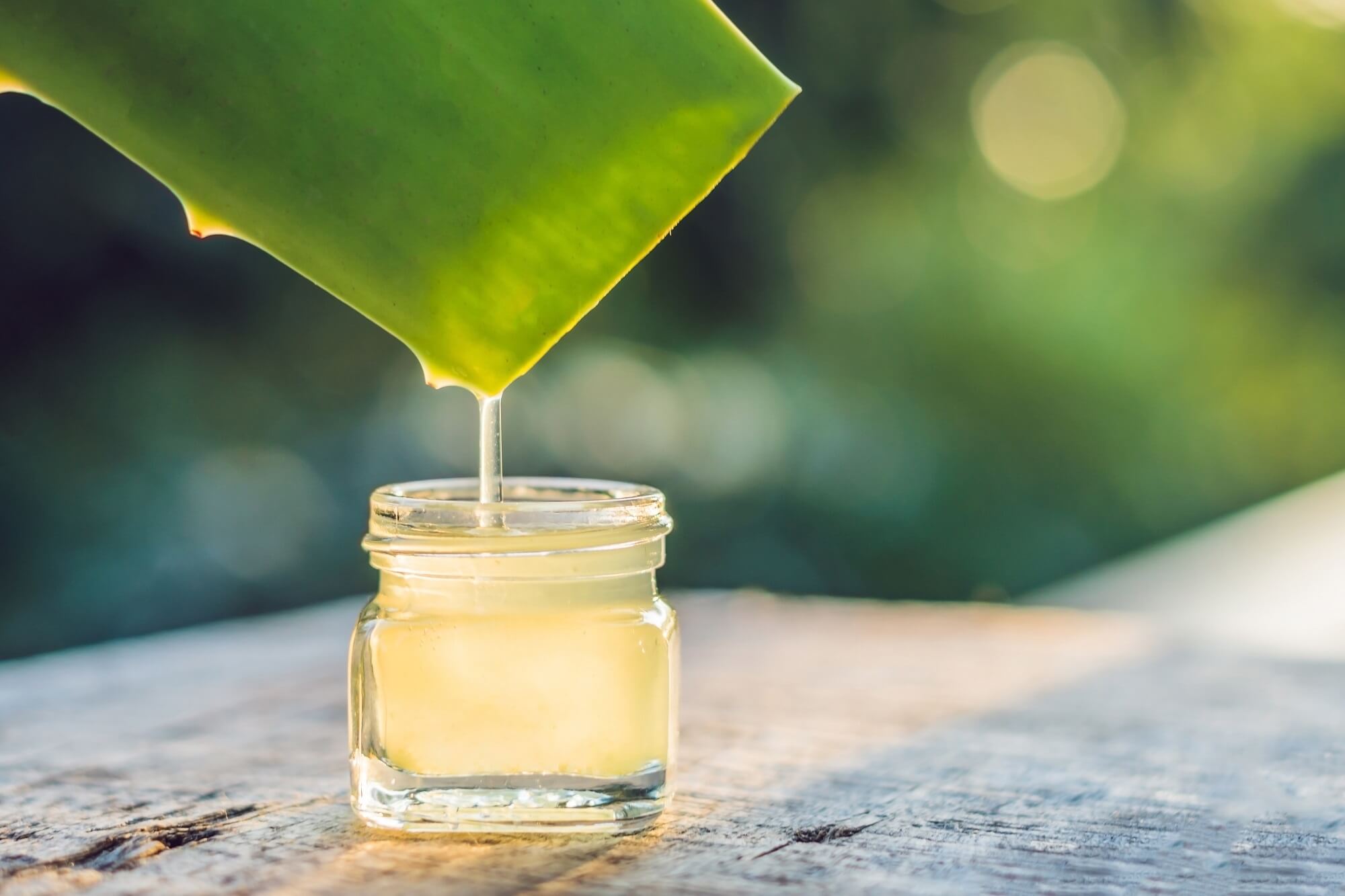
Aloe vera (Aloe barbadensis) juice is a capable laxative. The juice is not the gel of the inner leaves; typically the juice is called “latex.” Aloe vera latex is a powerful laxative, and should be used infrequently and preferably as a last resort. Chemicals called anthraquinones are what gives Aloe latex such a powerful “laxative punch.”
The latex (i.e., the juice) comes from just under the surface of the plant’s outer green cuticle. The latex is what is a powerful laxative; if you eat the gel it may not do much of anything at all!
The renowned late Dr. James A. Duke, in his book The Green Pharmacy Herbal Handbook,(source 1) states Aloes were once widely used as a laxative, but their popularity has subsided. The anthraquinones in Aloe vera are quite strong, possibly too strong for a regular case of constipation.
In this same book, Dr. Duke makes it clear that Aloe vera and drug Aloe are two different things. This juice is then processed to form drug Aloe. Drug aloe may be referred to as latex.
Deanne Tenney, in her short book Aloe Vera(source 3) elucidates how drug aloe is made:
The bitter yellow juice found in the outer leaf layer of the aloe plant is often found in herbal laxative combinations. Aloe leaves are cut to release the juice, which is then heated to evaporate the water content. The resulting product is a brown mass called drug aloe.
Aloe Vera by Deanne Tenney, pp.12
So in general, try other mild laxatives and a diet high in fiber first before you reach for Aloe vera latex or drug Aloe.
Why Aloe vera Might be Right for Constipation
The use of synthetic drugs, such as Correctol, Ex-Lax, Senokot, and Gaviscon (having sennosides as the active ingredients) is quite common. Yet, use of these drugs is restricted by the high financial cost, slow speed of results (they can take up to 8 hours), and side effects.(source 5)
As a result, nearly half of constipation patients are not satisfied with conventional laxative drugs.(source 5)
Thus, if you are looking for a low cost, occasional solution to constipation, this herb might be a solution. The German Commission E (a scientific advisory board of the German government formed in 1978) has endorsed Aloe vera as a treatment for constipation as well.(source 4)
If you do decide to try Aloe vera latex, Dr. Duke recommends a dosage of 250mg of latex in capsule form or 50 to 200mg of the dried juice per day.(source 1)
Quick Precautions
In another of Dr. Duke’s books, The Green Pharmacy,(source 2) he states that anthraquinone laxatives should not be taken for long periods of time or during pregnancy and nursing. Dr. Duke warned that if you take these laxatives for too long, you might become dependent upon them. Thus, keep them as a last resort.
And, because of the side effects that can occur, Aloe vera latex is not recommended to treat constipation in children.(source 6)
Samuel Bart’s Digestive Health Solution
Samuel Bart has always been passionate about plants and their ability to keep us healthy. He has put together some of the best natural ways that could help anyone support a healthy digestive system.
Samuel perfected an easy, yet powerful formula, which consists of amazing ingredients. Bart’s supplement is backed by a ironclad 60-day, money back guarantee.

Why Aloe vera is a Natural Laxative
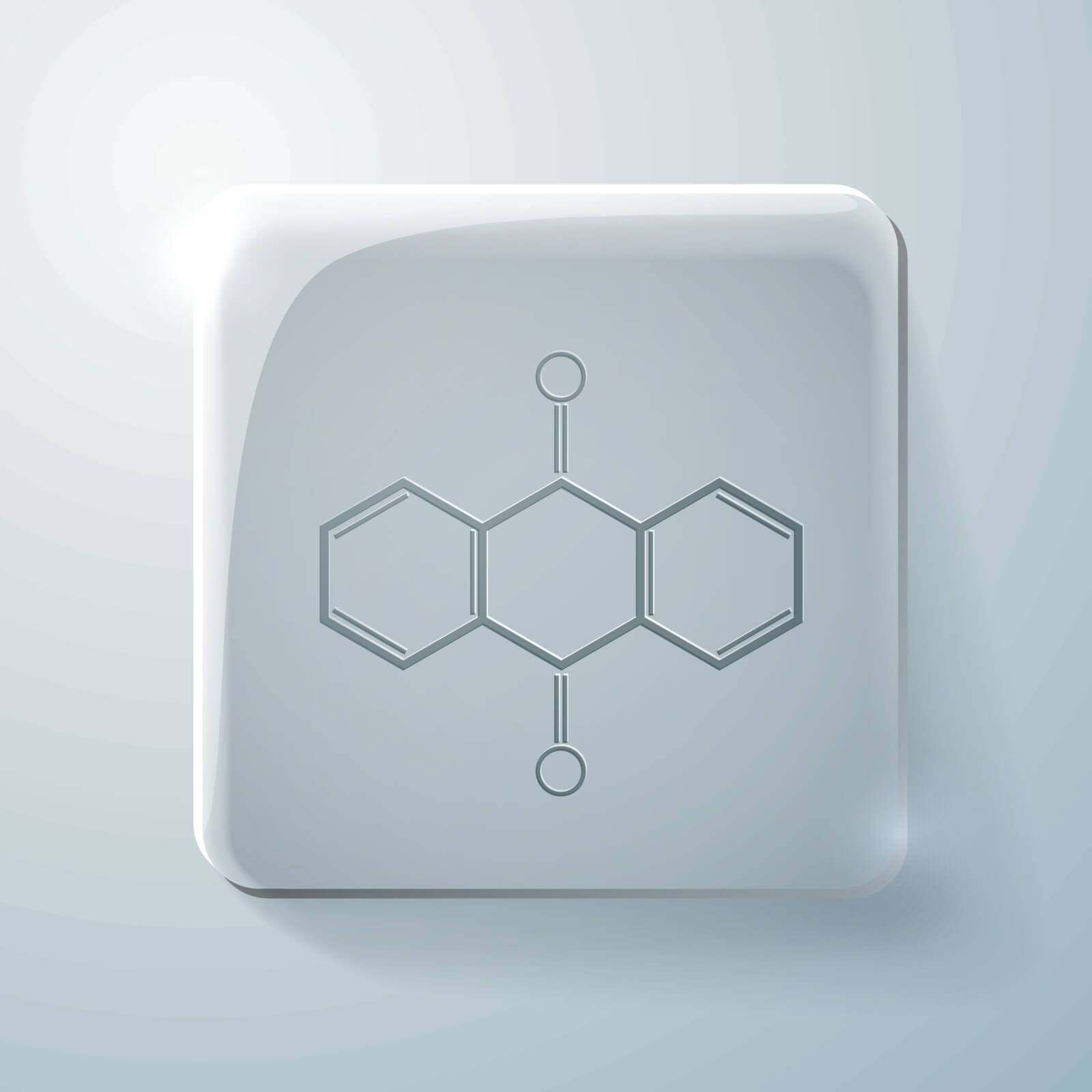
The reason why Aloe vera is a natural laxative is due to the phytochemicals (plant chemicals) anthraquinone, glycosides, and aloins A and B. These chemicals are present in the rind of the herb.(source 6)
The largest group of naturally occurring quinones are anthraquinones. These chemicals occur in the form of hydroxyanthraquinones.(source 8) Hydroxyanthraquinones are the active phytochemicals of many medicinal plants, including Aloe vera, that have a history of being used as laxatives.(source 7)
Anthranoid laxatives are some of the most commonly utilized and studied anthraquinone derivatives. When they are ingested, these compounds do not get broken down in the stomach or by α-glucosidase enzymes in the small intestine. As a result, they travel to the large intestine intact.(source 7)
When anthraquinone derivatives reach the large intestine, bacteria digest them with enzymes known as reductases and β-glucosidases. These enzymes convert glycosylated (having undergone glycosylation) compounds into pharmacologically active aglycones.(source 7)
Aglycones have an effect on epithelial cells (cells lining the intestines in direct contact with the material passing through) of the large intestine; ultimately changing the rate at which intestinal contents pass through, material absorption, and excretion.(source 7)
Remember to be careful with anthraquinone laxatives; as one study stated, the anthraquinones in the aloe latex can cause mild cramping that may occur for several days.(source 6)
Guaranteed 24 Hour Constipation Relief
Dr. Scott McLeod, PharmD received his doctorate from the WSU College of Pharmacy. His book on constipation is guaranteed to show you how to get relief in 24 hours or less-or your money back (60 day, 100% refund guarantee).
Everything used in this plan is from nature. No use of harmful laxatives. People who have used these say they work BETTER than over-the-counter laxatives!

Barbaloin: an Aloin which Effects the Intestines
The aloin barbaloin is also one of the major components of this herb; and, it has a critical role as a laxative. Barbaloin is metabolized to aloe-emodin-9-anthrone (AE-anthrone) by bacteria in the intestines.(source 9)
AE-anthrone helps the intestines move the material inside them better. It also increases paracellular permeability by inhibiting Na+ / K+-adenosine triphosphatase at the colonic mucosa.(source 9)
Essentially, paracellular transport refers to substances passing into the body via the spaces between cells. These spaces are mainly regulated by "tight junctions." Tight junctions are like the doors in the spaces between cells that determine if something can be transported through these spaces.(source 10)
Epithelial cells line the inner layer of the intestinal lumen (hollow space inside), so they are in direct contact with the food passing through the intestines. The intestinal epithelium is the layer of cells in contact with the lumen. It is here material can pass into the body via paracellular transport.
Naturally Treat Hemorrhoids in 48 Hours
Jessica Wright’s unique 5-step, all-natural approach to hemorrhoid treatment delivers permanent relief. Heal hemorrhoids in 48 hours, and eliminate the root cause in 30 to 60 days.
Benefit from Jessica’s 12 years of research; her book is backed by a 60 day, 100% money back guarantee.

Research on Aloe vera for Constipation
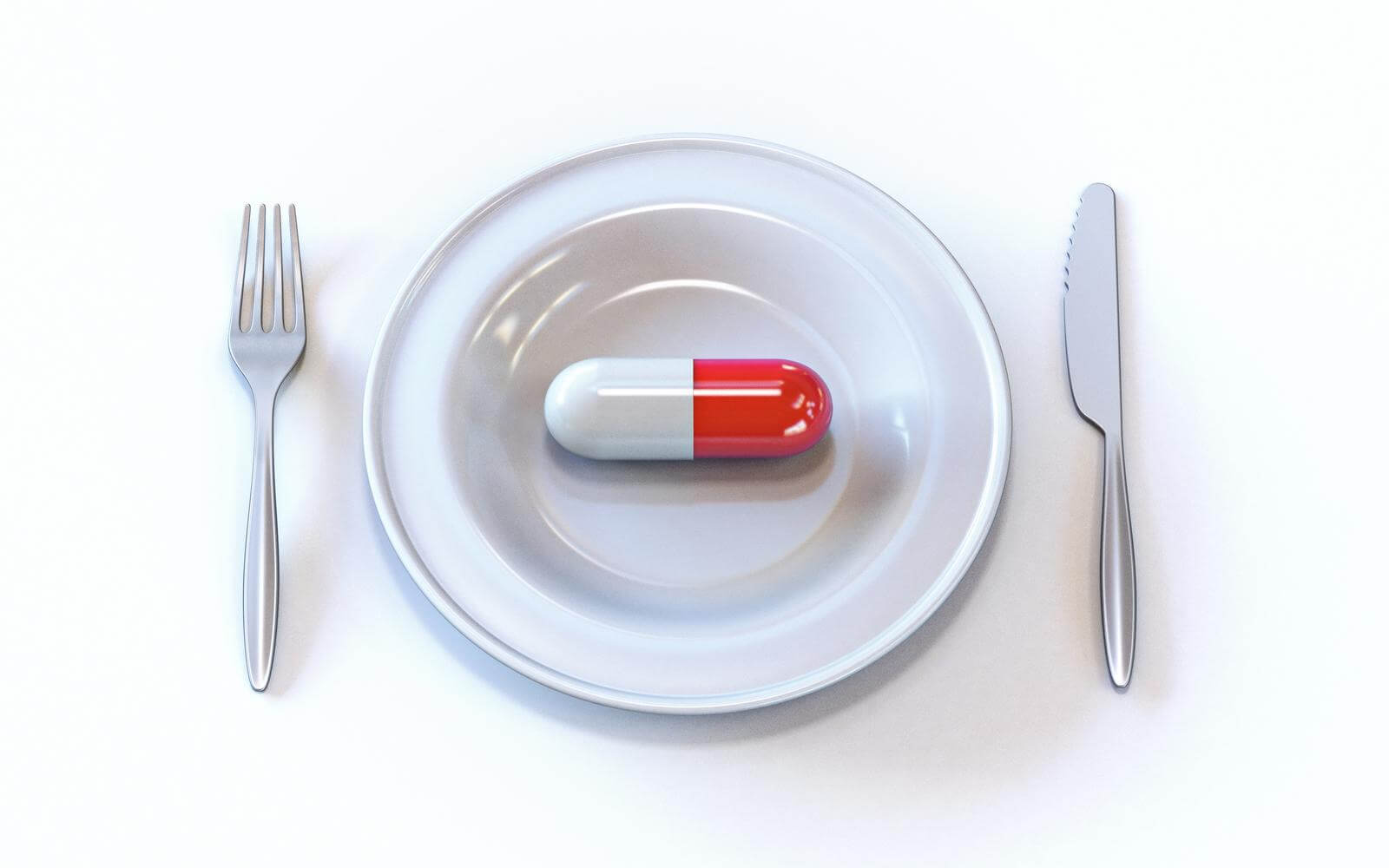
A 2011 study in the Journal of Natural Pharmaceuticals(source 5) tested Aloe vera's laxative ability on albino rats with loperamide induced constipation.
For their extract the study dried Aloe vera leaves and then ground them into a powder. This powder was then shaken with ethanol (drinking alcohol) for 24 hours. The extract was processed further and made into doses of 50, 100, and 200 mg/kg of body weight for the experiment.
Rats given the extract had significantly more water intake. The extract also significantly increased the weight, quantity, and water content of fecal pellets in a dose-dependent manner. Body weight was also normalized after rats were given the extract.
The study concluded that Aloe vera does have a laxative effect. The following conclusion, in the author's own words, is taken from this study:
The present study revealed that oral administration of the ethanolic extract of A. vera exhibited a laxative activity in rats with loperamide-induced constipation rats. This suggests the beneficial effects of the herb in improving intestinal motility. Noteworthy is the fact that the extract at the highest dose of 200 mg/kg body weight showed the best laxative action, which compared favorably with Gaviscon. These findings have lent scientific support to the use of A. vera as a laxative agent in Nigerian folkloric medicine.
Journal of Natural Pharmaceuticals [2.3 (2011): 158-162]

Comprehensive Herbalist School
Dr. Patrick Jones, founder of the HomeGrown Herbalist School of Botanical Medicine has been a practicing veterinarian for over 25 years. He is also a clinical herbalist and traditional naturopath.
Kevin Harrington, Original Shark from ABC’s Shark Tank, stands behind Dr. Patrick Jones and HomeGrown Herbalist.
Learn More
Comprehensive Herbalist School
Dr. Patrick Jones, founder of the HomeGrown Herbalist School of Botanical Medicine has been a practicing veterinarian for over 25 years. He is also a clinical herbalist and traditional naturopath.
Kevin Harrington, Original Shark from ABC’s Shark Tank, stands behind Dr. Patrick Jones and HomeGrown Herbalist.Learn More
A 2016 study in the Indian Journal of Science and Technology(source 11) shows that results with Aloe vera can vary. The study does not readily state how much Aloe vera it gave study participants, or the type of Aloe vera (if an extract was used, if latex was used, etc.) it used.
Thus, it does show that some administrations of Aloe vera will not always present the best efficacy. Yet, even this study did show that this herb affected constipation patients.
This study was conducted on schizophrenia patients taking antipsychotic drugs. About 20% of patients taking antipsychotics may have constipation. This study cites research finding that 18.7% of people taking antipsychotic drugs have long-term prescriptions for laxatives. Constipation is a well known side effect of antipsychotic drugs.
The study included 50 schizophrenia patients; some served as controls (not taking Aloe vera) while others were allocated to the experimental group (those taking Aloe vera).
The study found that those taking Aloe vera had improved defecation frequency and less feeling of incomplete evacuation. This difference was significant.
A Constipation Assessment Scale (CAS; a tool using a 3-point Likert scale for a total of 8 items; a higher score means worse constipation) was used and the group taking Aloe vera had a score of 5.4 before taking the herb. After 4 weeks of taking Aloe vera the CAS score was 6.5.
Additionally, time spent defecating, degree of difficulty in defecating, and overall bowel function did not change over 4 weeks.
More Evidence Aloe vera Works for Constipation
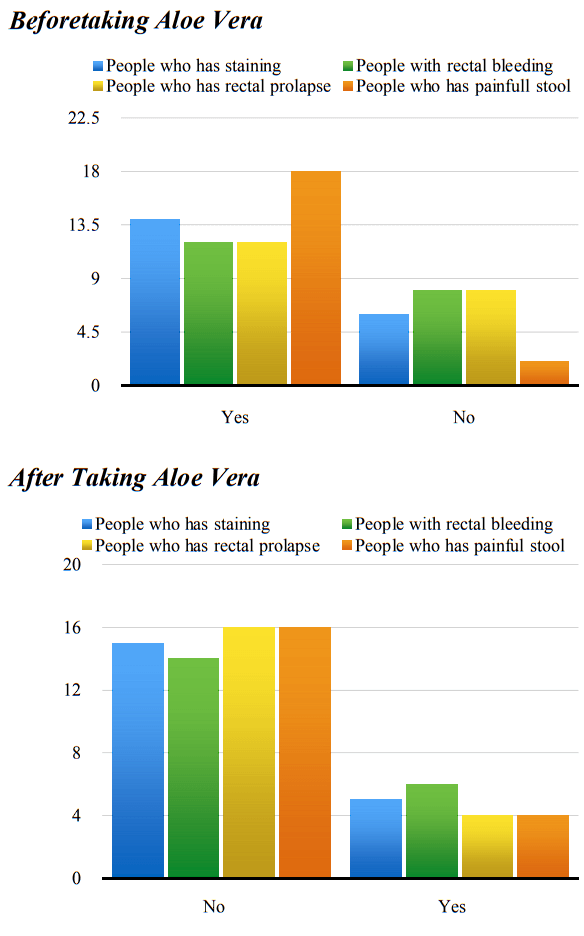
A 2017 study in the International Journal of Current Advanced Research(source 12) examined how Aloe vera would affect constipated volunteers. 20 people participated in this study. The study had the participants take 100 to 200 mg of Aloe vera latex two times a day on an empty stomach.
The results of the study showed a considerable change to the state of constipation for the participants. The following results were seen:
- Straining during bowel movements: 14 participants before treatment, after treatment only 5 had straining.
- The occurrence of rectal bleeding: 12 participants before treatment, after treatment only 6 had rectal bleeding.
- The occurrence of rectal prolapse (when part of the large intestine slips outside the anus): 12 participants before treatment, after treatment only 4 had rectal bleeding.
- Pain during bowel movements: 18 participants before treatment, after treatment only 4 had straining.
The study concluded that without question Aloe vera latex is a good natural remedy for constipation. This herb's latex increases fluid in the intestines and softens the stool; and, also helps stimulate the muscles of the intestine which helps bowel movements.
Dr. John Herzog (MD)
Dr. John Herzog, a "survival surgeon" from Maine explains what home remedies work best in a crisis situation.
This may be important in the event you require first-aid or are in an emergency situation without easy access to a hospital. Dr. John Herzog has assembled a large collection of home remedies for such scenarios.

The Possible Side Effects of Aloe vera
The side effects of Aloe vera is a topic that is beyond the scope of this article. Herbsey does have an entire article on this topic. If you want an evidence based overview of side effects and contraindications, check out the article on this: Aloe vera Side Effects.
Aloe vera is an herb that has been used since antiquity; hence, it has a long history of use by many culture’s traditional medicine. And, as research will demonstrate, topical application is generally well tolerated. The most probable side effects for external use are due to allergic reactions.
Internal use can be done, but there are more precautions to be aware of. And, prolonged ingestion of Aloe vera, especially the inner juice (also known as the “latex”), should be avoided. The latex is such a powerful laxative that you really need to exercise caution with it!

HomeGrown Herbalist Herb Shoppe
Owner of HomeGrown Herbalist Dr. Patrick Jones is a practicing veterinarian, Clinical Herbalist, and traditional naturopath. He owns and operates Fairview Animal Hospital in Buhl, ID.
Their herb shoppe provides herbs, essential oils, and tools. If you have some time, check it out!
Learn More
HomeGrown Herbalist Herb Shoppe
Owner of HomeGrown Herbalist Dr. Patrick Jones is a practicing veterinarian, Clinical Herbalist, and traditional naturopath. He owns and operates Fairview Animal Hospital in Buhl, ID.
Their herb shoppe provides herbs, essential oils, and tools. If you have some time, check it out!Learn More
Some quick guidelines for internal use, i.e. cases where Aloe vera should be avoided:
- You are pregnant
- You are taking anticoagulant medications
- You have kidney or cardiac problems
- You have any known allergy to plants in the lily (Liliaceae) family
Claire Goodall’s Amazing Guide
Clair Goodall is a bee-obsessed, natural medicine convert from Minnesota (USA). And, she does keep bees!
Clair has created 350+ page book documenting how to replace the toxic products and medications in your home with healthier, all-natural alternatives.

A Natural Digestive System Supplement that Helps
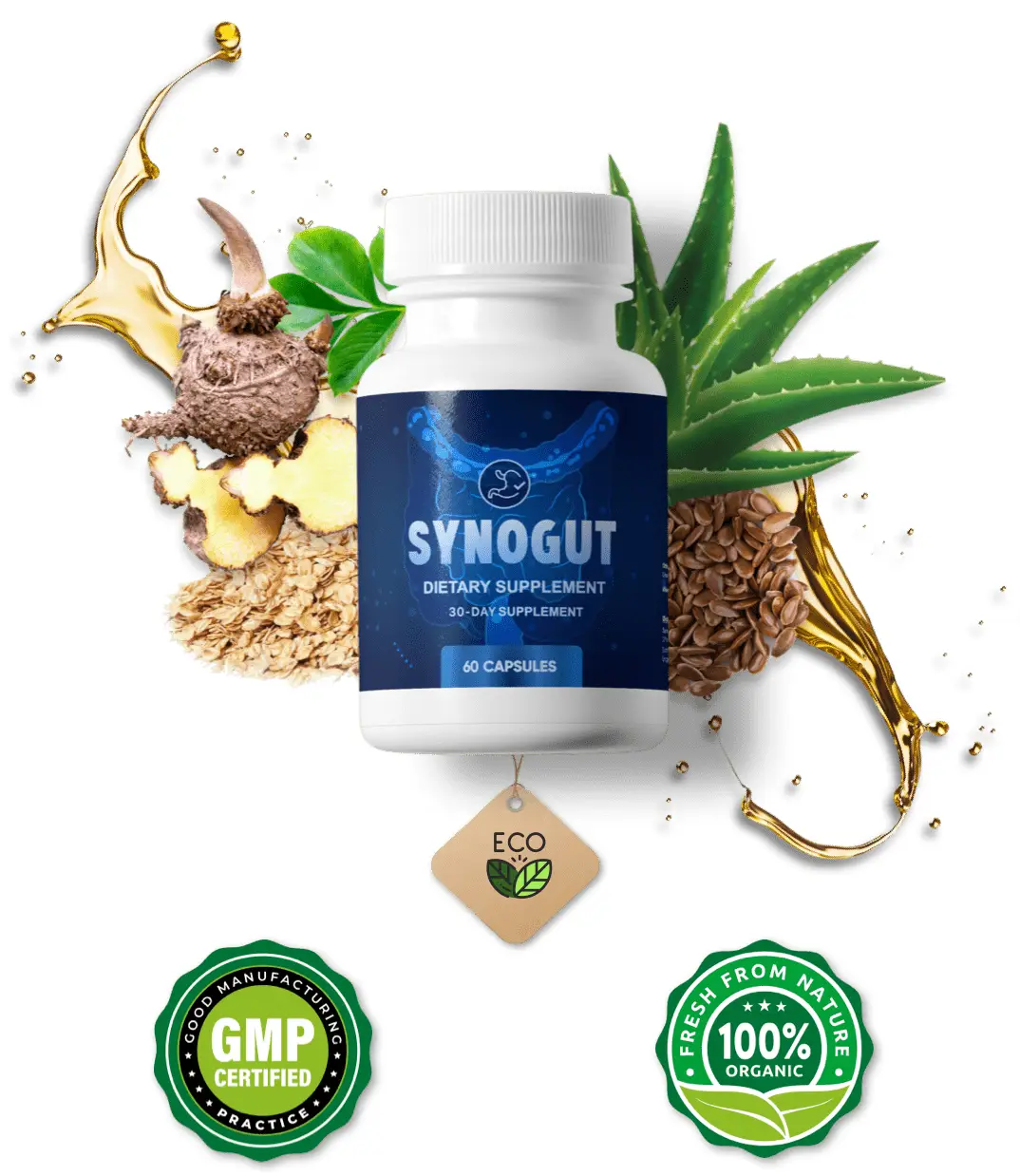
If you have been struggling with digestive problems like constipation, you should know about Samuel Bart. Mr. Bart lives with his wife, Alma, in Nashville, Tennessee.
Mr. Bart has always had a passion for plants and how to use them medicinally. He went on to research some of the most effective ways that could help people support a healthy digestive system.
To this end, Mr. Bart developed a product he calls “SynoGut.”
Every capsule of this supplement is made in the USA, in a FDA approved, and GMP certified, facility under sterile, strict, and precise standards. Synogut capsules are non-GMO. You can rest assured that they do not contain any dangerous stimulants or toxins, and more importantly, they are not habit forming.
His proprietary blend blend contains the following ingredients:
- Psyllium husk
- Bentonite clay
- Black walnut hull
- Oat bran
- Flaxseed
- Prune fruit
- Aloe vera leaf
- Lactobacillus acidophilus (a probiotic bacteria)
- Apple fruit pectin
- Glucomannan root
If this is not the first time you have had constipation, you might benefit from the power these natural items can provide. And, if you have had prolonged constipation, utilizing a supplement like Mr. Bart’s could help you become more regular—without an arsenal of prescription drugs.
Many people have tried synthetic drugs to solve their constipation issues; and if these didn’t work, it may be hard to invest in a natural remedy like SynoGut. To this end, Mr. Bart offers a 60 day, full refund guarantee on his supplement.
If you decide to invest in Mr. Bart’s supplement, and are not satisfied with the results, you can quickly request a refund. SynoGut will promptly refund your purchase; ensuring there is no risk to give Mr. Bart a chance.
SynoGut is sold via the large online retailer ClickBank—a company based in Boise Idaho, USA. ClickBank sells products across the world, and ensures you can get a refund if you are not satisfied with SynoGut’s results.
If you are in a situation where you have “tried everything,” SynoGut is worth the quick purchase and a solid test drive. If you would like to learn more about Samuel Bart’s SynoGut supplement, you can do so at the SynoGut website.
About the Author
Geoff Kent is a natural medicine enthusiast who has been researching and writing about natural medicine since 2008. Geoff is primarily a web developer, but also researches and authors written and video content about natural health. Geoff has a bachelor’s degree in Management Information Systems from the University of Northern Iowa.
More on Geoff KentImportant Disclosures & Disclaimers
It is important to use the information you find on Herbsey.com in the right way. Also for legal reasons, these disclaimers and disclosures are necessary. For further information about each, feel free to click the link provided to the page on this website that provides more information.
Medical Disclaimer
The information on this website is not a prescription for anyone. This information is for informational or educational purposes only, and is not a substitute for professional medical advice or consultations with healthcare professionals.
Advertisement Disclosure
Some of the links provided on this article and website are affiliate links. If you purchase a product after clicking on these links, Herbsey.com will earn a commission. Herbsey.com promotes various products through advertisement and text links. For more information: Our Advertisements.












